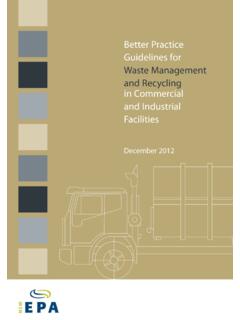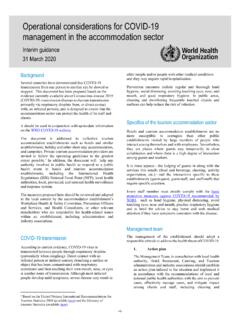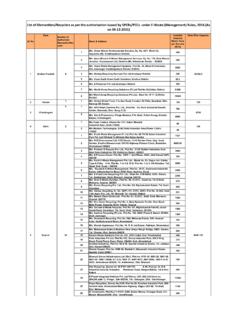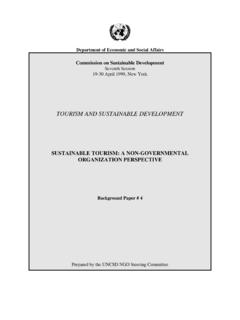Transcription of The impacts of the cruise industry on tourism destinations
1 Sustainable tourism as a factor of local development Monza, Italy, 7-9/11/2008. The impacts of the cruise industry on tourism destinations 1 2. JUAN GABRIEL BRIDA SANDRA ZAPATA AGUIRRE. 1 School of Economics and Management, Free University of Bolzano, e-mail: 2 Escuela de Turismo, Facultad de Administraci n, Colegio Mayor de Antioquia, e-mail: Abstract: In this paper we describe the evolution of the cruise tourism industry and we analyze different impacts on tourism destinations of this segment of the travel industry . The study includes the discussion of economic, social, environmental, cultural and political effects. We present data to analyze and compare the performance of the main cruise destinations and cruise lines. Analysis and data are based mainly on a selection of information taken from different official worldwide reports (OMT, CTO), press releases and previous studies.
2 The economic impact is estimated from tourist expenditure and local information. Environmental impacts are compiled from historical and current data. We also describe different activities related to the cruise ship industry to identify costs and benefits to different actors of the local economies. From the analysis, we discuss some stylized facts about the cruise ship industry and we show that some optimist evaluations of local decision makers are not completely true. Keywords: cruise Ship tourism , Socio-Economic Impact, Environmental Impact 1. Introduction The cruise ship industry has been the fastest growing segment in the travel industry around the world, and since 1980, the average annual growth rate in the number of cruise passengers worldwide has been In 2007, million worldwide passengers were carried on the cruise Lines International Association members, an increase of 4, 1% over the previous year.
3 Cruises are especially popular in the United States and in 2007, 10 million Americans took a cruise vacation representing 76. percent of the total cruise passengers of the World and is expected 51 million of them cruising in the next there years (CLIA, 2008). Nowadays, there are about 300 liners sailing the world's seas, with further 35 ships scheduled to join the global fleet over the next four years representing investments over U$D 20 billion. But as ship order book and passenger number grow, so, too, do cruising's impacts at different levels: socio-cultural, economic, politic and environmental. The Caribbean region, continue being the most preferred cruise destination; according to FCCA. statistics, accounting for of all itineraries. Consumer interest in cruising continues being strong despite downward pressure on travel in general due to the economy and fuel costs; 77 percent of past cruise vacationers and 55 percent of vacationers who have not taken a cruise , expressed interest in doing so within the next three years.
4 All over the world, but especially in the Caribbean region, one can observe that local governments investing large amounts of money in high quality infrastructures to attend the colossal ships and thousands passengers arrivals. There are very few studies concerning the different impacts of the cruise industry to destinations . Then the question is: are we sure that the benefits of attracting cruises to a tourism destination are higher than the costs? Is it sure that the major players in the cruise industry , including cruise lines, local governments and population, shore operators, civil society organizations are taking proactive measures to ensure a sustainable future for cruise tourism while preserving cruise destinations ? Management techniques, such as regional collaboration to levy head taxes in order to increase economic benefits and limiting total cruise passengers to reduce social impacts must be coordinated between local governments.
5 With the cruise industry 's boom, nobody wants to be backward. Maybe that is the reason why several governments, especially in Latin America, provide surveys and data about the cruise passenger's expenditure that are not adequately justified. There are some studies that show values of cruise passenger expenditures higher than expenditures of normal tourists who have to pay hotel and meals (US$ spent by a cruiser compared with US$ spent by a non cruiser tourist in a week, according to FCCA). 2. cruise impact's overview Economic Effects The cruise industry has the potential to provide economic benefits to a port state. These economic benefits arise from five principal sources: 1) spending by cruise passengers and crew; 2) the shoreside staffing by the cruise lines for their headquarters, marketing and tour operations 3) expenditures by the cruise lines for goods and services necessary for cruise operations; 4) spending by the cruise lines 1.
6 Electronic copy available at: Organized by GRISS Research Unit on Sustainable Development, University of Milano Bicocca for port services; and 5) expenditures by cruise lines for the maintenance. However, accommodation of large cruise ships into port requires a great deal of initial capital investment in infrastructure as well as maintenance costs. As cruise ships continue to grow larger, further investment may be required. Under these types of tourism scenarios with high infrastructure or environmental costs, rapid growth of tourism may result in a stagnation of or even a decline in GDP (Gooroochurn and Blake (2005);. Nowak et al (2003) and Nowak and Sahli (2007)). Without significant foreign investment into this infrastructure, it is questionable whether construction of large cruise ship terminals could pass a benefit-cost analysis.
7 According to CLIA (2007) the major economic impacts of the cruise industry during 2006 included a total passengers and crew expenditures that generated $ billion in gross output in the United States, a percent increase over 2005. This, in turn, generated just under 348,000 jobs throughout the country paying a total of $ billion in wages and salaries. These total economic impacts affected virtually every industry in the United States. tourism is one of the main sectors for the development of the Central American and Caribbean regions and therefore, it must be supported by both the public and private sectors (Espinal, 2005). In 2008 a record of 11 million passengers are forecasted to cruise in the Caribbean region. The cruise visitors contributed to tourism with more than 21 million dollars.
8 The industry is also booming in Asia, Australia and Europe. The , Germany and Italy are experiencing considerable growth in the popularity of cruising and there is also significant development in Spain (but less in France (Klein (2003). Power Groups Arguably, cruise lines are the most benefited with the activity. More than 50% of land-based activities are sold on board by themselves. From the value paid by cruisers for on shore activities, the local tour operator is left with between a level of 50% and sometimes 25% of that value. tourism service providers who want to appear in advertisements delivered on board (videos, brochures, etc.) have to pay for it. There is a high cost of participation in the most important annual industry event that ranges from $ 16,500 including registration and booth (Klein (2005).)))
9 Others incomes provide from "the dream islands". These territories are private islands property of each cruise line. This clearly reduces the economic benefit to communities not to disembark at the destination. There are no profits for the chain of local tourism and cruise lines obtain all incomes, from rental of aquatic equipment, food and beverages to souvenirs that are sold to passengers on board. Like any great business, cruise industry , is a strong lobbying group of lawmakers in port destination. From 1997 to 2007 cruise Line International Asociation spent the amount of US$ on lobbying the Congress ( cruise Junkie). It was also noted that power with the participation of the Carnival Corporation as a partner of the firm Puerta Cancun-Xcaret, SA de CV, whom the Mexican government gave the construction and operation of a terminal for big ships, the fact generated a heated debate.
10 Others significant lobbing groups are the wholesaler receptive tourism operators. These companies are able to underbid, then so, they dominate the operation of tours and shore excursions in the port destination. Small local tourism operators and providers not only resign themselves to profit what the cruise line deems fit, but they would have to deal with displeased passengers. These operators prefer not to vie with cruise lines for fear of losing the small part of the business that they share. On the other hand, there is a group is composed by hotel sector. cruise sector causes apprehension to hotel managers for reasons as the nonpayment of taxes compared with those who pay these entrepreneurs. In Aruba, hotels and operators feel that their traditional packages lose ground to ships scheduled.










